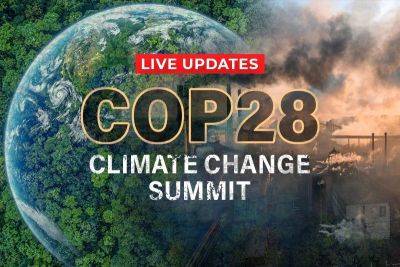'We felt it first': Climate-threatened islands battle fossil fuels at COP28
DUBAI, United Arab Emirates — Despite being among the least to blame for global warming, small islands have been some of the first to witness the catastrophic impacts of climate change.
"Everybody feels it now with the fires and the droughts and the hurricanes," Tina Stege, the Marshall Islands climate envoy told AFP, "but we felt it first and the effects will hit us fastest."
At the COP28 UN climate talks in Dubai, small island states have been key in the drive for the most ambitious temperature targets and a fossil fuel phase-out, as they battle devastating storms and rising sea levels.
The Alliance of Small Island States (AOSIS), a group of 39 small islands in the Pacific, Caribbean and elsewhere, have been at the forefront of the battle to keep the world on a path towards limiting global warming to 1.5 degrees Celsius above pre-industrial levels—a key commitment of the landmark 2015 Paris Agreement.
With global temperature rise threatening to soar past that threshold, the small islands are among the most determined to "keep 1.5 alive".
There is "no alternative", said AOSIS chair Cedric Schuster, during a COP28 address on Monday.
"For our small island developing states, everything centers on keeping global warming below the 1.5C limit," he added.
In a stark reminder of the high stakes, Australia last month agreed to a landmark deal with Tuvalu to offer sanctuary to the island nation's 11,000 residents should their home be engulfed by rising seas, as expected this century.
Two of Tuvalu's nine coral islands have already largely disappeared under the waves, and climate scientists fear the entire archipelago will be uninhabitable within the next 80 years.
And on Tuesday, the Marshall Islands announced a national adaptation "survival plan" for navigating their home's uncertain future in the face of climate impacts.
It outlined measures against rising seas, population relocation within its borders and suggested exile only as a last resort.
"In some islands, when you drive, you'll see there is ocean on one side, lagoon on [the other] side," Fiji's chief negotiator at COP28, Amenatave Yauvoli, told AFP between negotiations.
"So what happens when there is a







